Unit 11 How was your school trip?Section A (Grammar Focus-3b)课件(共51张PPT)
文档属性
| 名称 | Unit 11 How was your school trip?Section A (Grammar Focus-3b)课件(共51张PPT) |
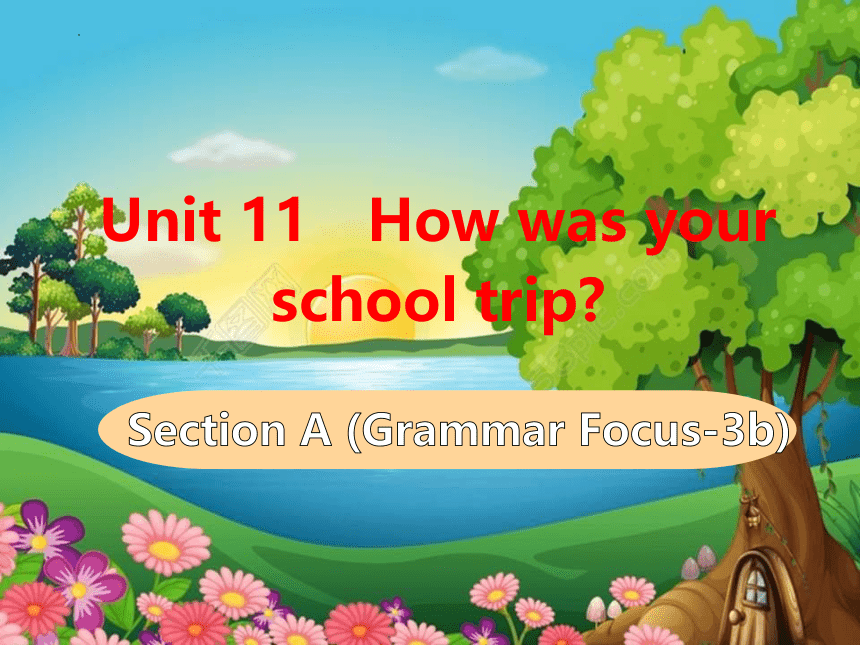
|
|
| 格式 | pptx | ||
| 文件大小 | 1.1MB | ||
| 资源类型 | 教案 | ||
| 版本资源 | 人教新目标(Go for it)版 | ||
| 科目 | 英语 | ||
| 更新时间 | 2022-06-14 07:58:06 | ||
图片预览

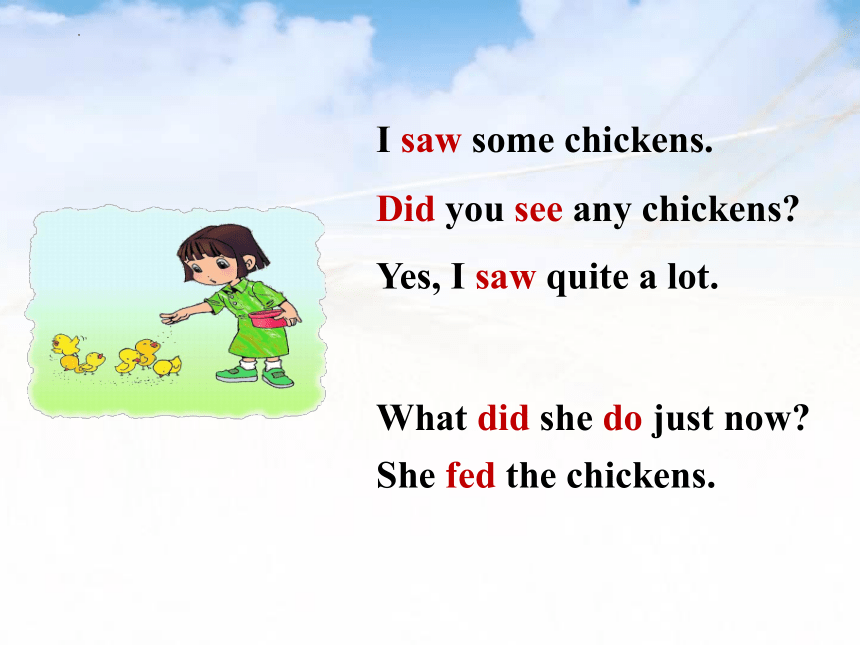


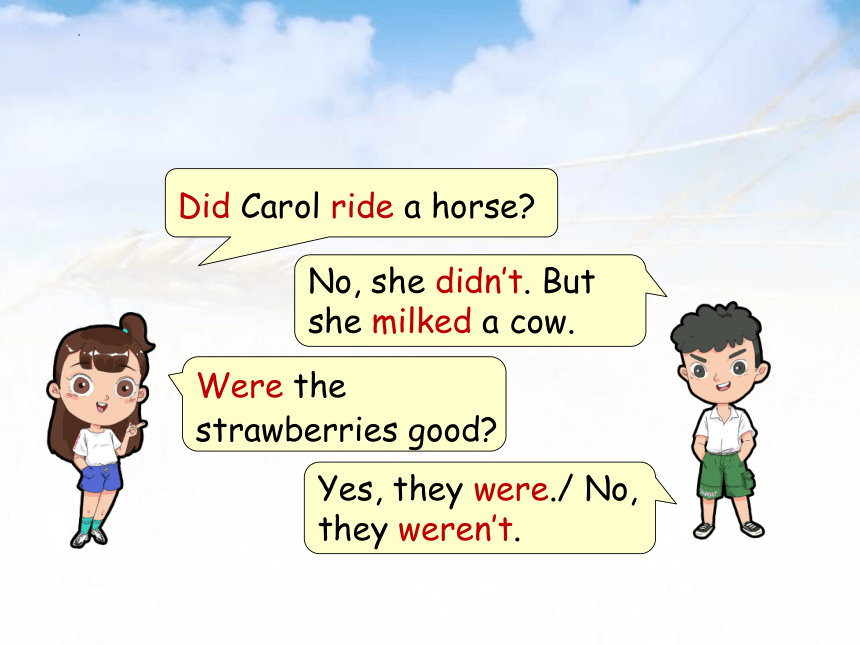
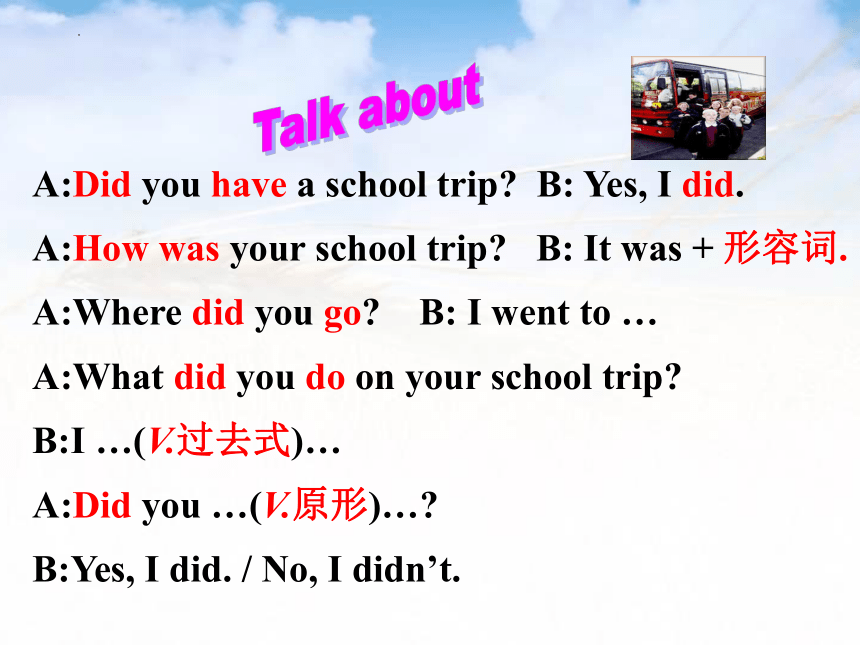
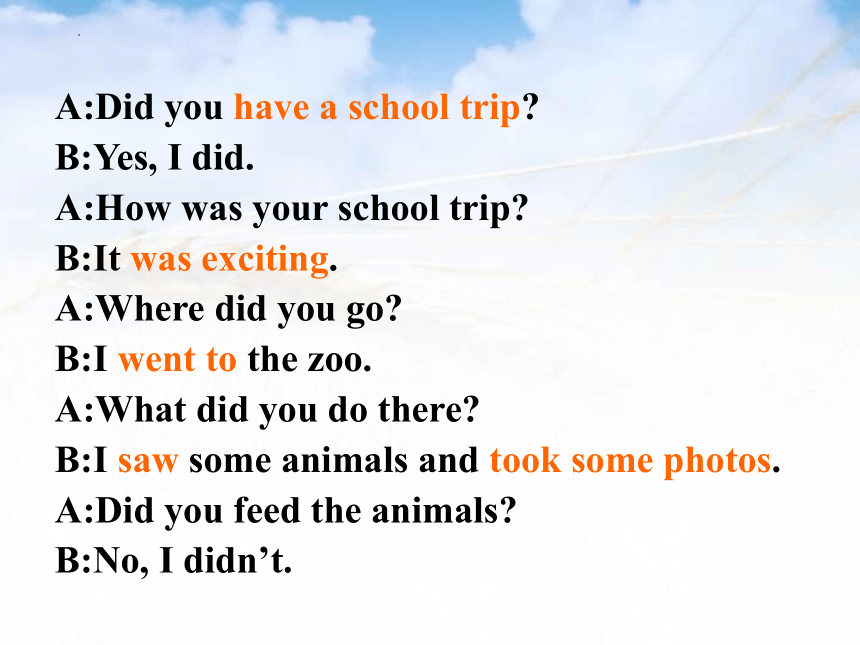
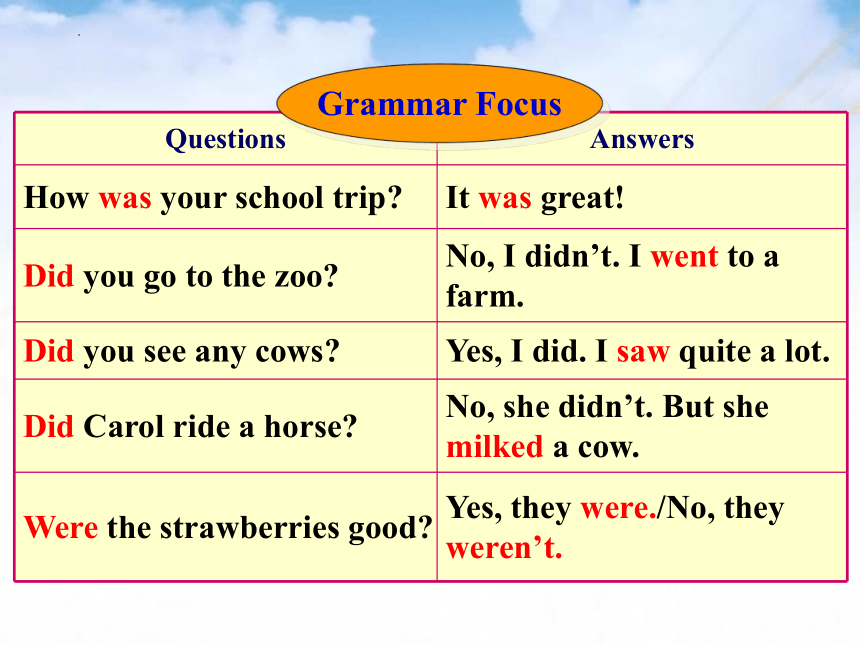
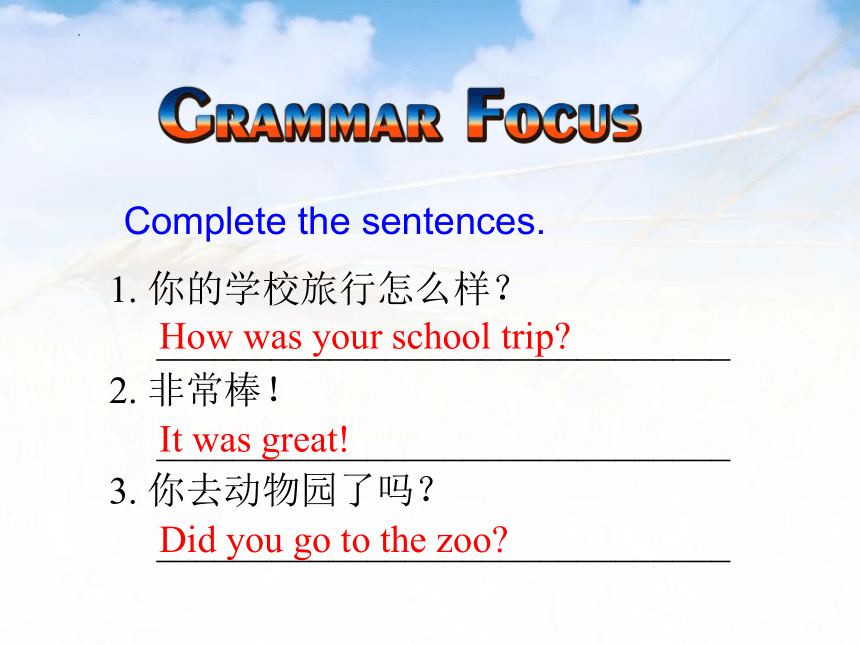
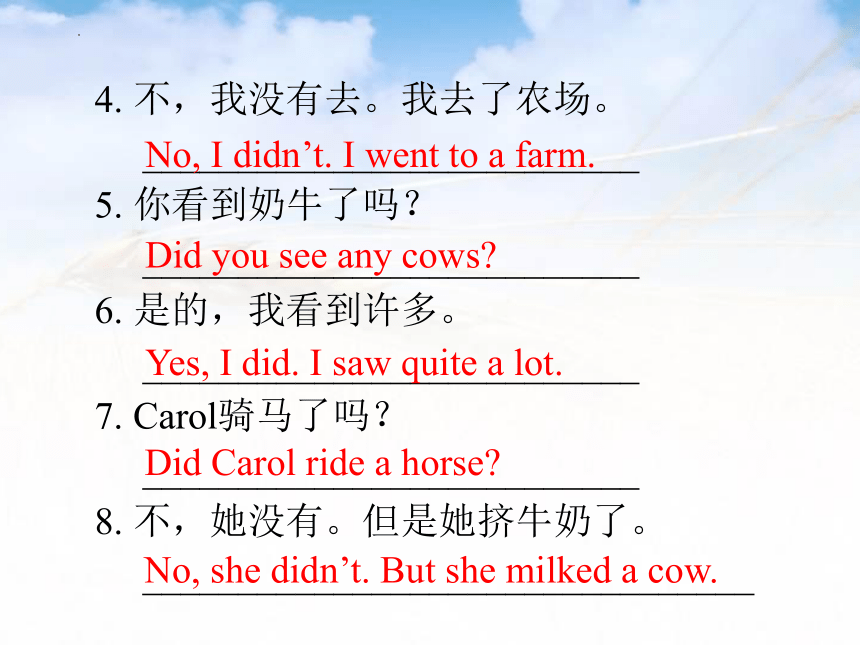
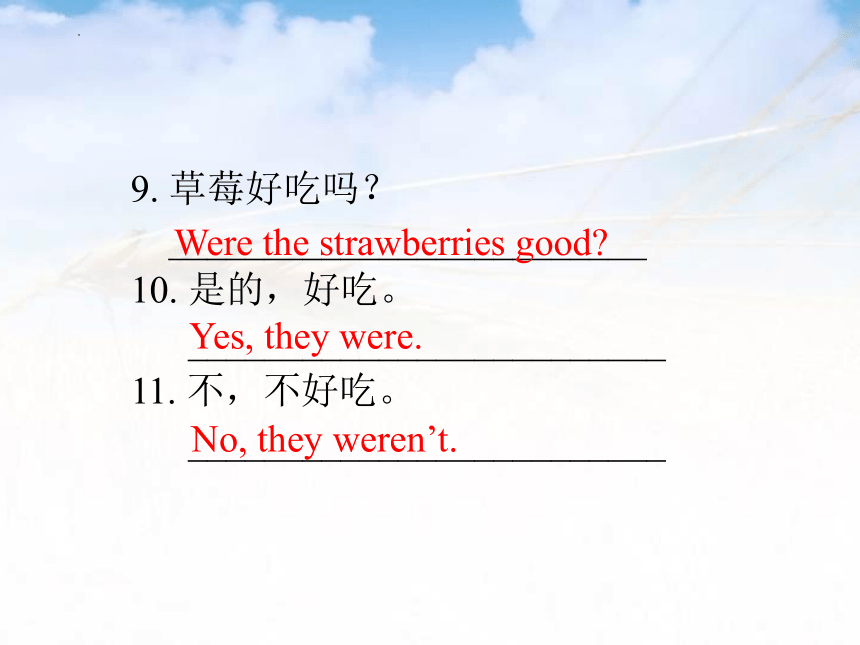
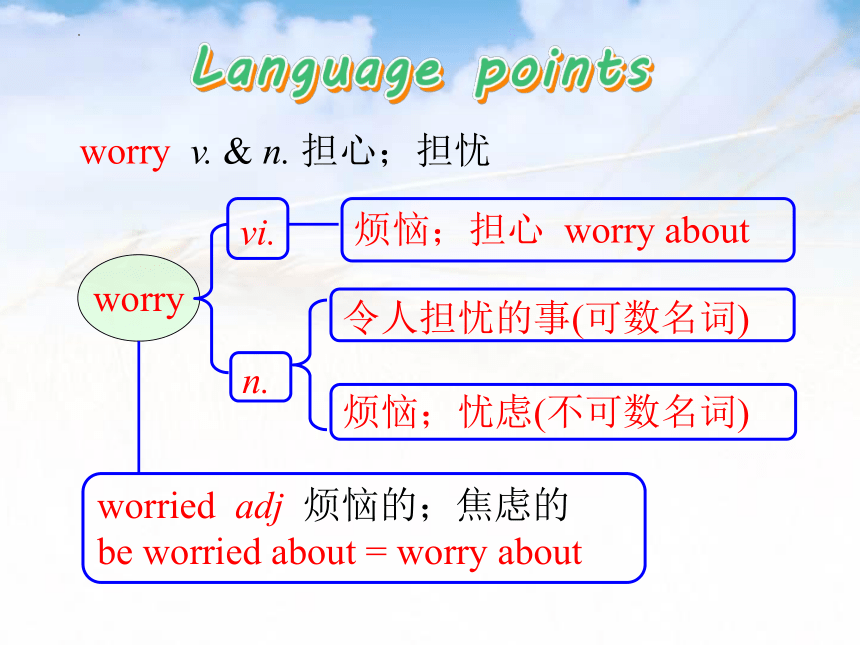
文档简介
(共51张PPT)
Unit 11 How was your
school trip
Section A (Grammar Focus-3b)
What did she do just now
She fed the chickens.
I saw some chickens.
Did you see any chickens
Yes, I saw quite a lot.
What did he do just now
He milked the cow.
Did he ride a horse
No, he didn’t.
But he milked a cow.
How was your school trip
It was great!
Did you go to the zoo
No, I didn’t. I went to a farm.
Did you see any cows
Yes, I did. I saw quite a lot.
Did Carol ride a horse
No, she didn’t. But she milked a cow.
Were the strawberries good
Yes, they were./ No, they weren’t.
A:Did you have a school trip B: Yes, I did.
A:How was your school trip B: It was + 形容词.
A:Where did you go B: I went to …
A:What did you do on your school trip
B:I …(V.过去式)…
A:Did you …(V.原形)…
B:Yes, I did. / No, I didn’t.
Talk about
A:Did you have a school trip
B:Yes, I did.
A:How was your school trip
B:It was exciting.
A:Where did you go
B:I went to the zoo.
A:What did you do there
B:I saw some animals and took some photos.
A:Did you feed the animals
B:No, I didn’t.
Questions Answers
How was your school trip It was great!
Did you go to the zoo No, I didn’t. I went to a farm.
Did you see any cows Yes, I did. I saw quite a lot.
Did Carol ride a horse No, she didn’t. But she milked a cow.
Were the strawberries good Yes, they were./No, they weren’t.
Grammar Focus
Complete the sentences.
1. 你的学校旅行怎么样?
______________________________
2. 非常棒!
______________________________
3. 你去动物园了吗?
______________________________
How was your school trip
It was great!
Did you go to the zoo
4. 不,我没有去。我去了农场。
__________________________
5. 你看到奶牛了吗?
__________________________
6. 是的,我看到许多。
__________________________
7. Carol骑马了吗?
__________________________
8. 不,她没有。但是她挤牛奶了。
________________________________
No, I didn’t. I went to a farm.
Did you see any cows
Yes, I did. I saw quite a lot.
Did Carol ride a horse
No, she didn’t. But she milked a cow.
9. 草莓好吃吗?
_________________________
10. 是的,好吃。
_________________________
11. 不,不好吃。
_________________________
Were the strawberries good
Yes, they were.
No, they weren’t.
worry v. & n. 担心;担忧
worry
烦恼;担心 worry about
vi.
n.
烦恼;忧虑(不可数名词)
令人担忧的事(可数名词)
worried adj 烦恼的;焦虑的
be worried about = worry about
【语境应用】翻译句子。
1) 我没有什么可担心的。
2) He brought his parents a lot of worry
when he was young.
3) 尽量忘掉你的那些烦心事吧。
I have nothing to worry about.
他小的时候给他父母带来很多烦恼。
Try to forget your worries.
一般过去时
一、用法
一般过去时表示过去某个时间或某一段时间内发生的动作或存在的状态,常和表示过去的时间状语连用,yesterday, the day before yesterday, ... ago, ... later, just now, at that moment, last ..., in 2001, in the past, last year等。如:
He was in the park yesterday afternoon.
I stayed at home from Monday to Friday last week.
Tom lived with his grandparents in the past.
一般过去时表示过去经常或反复发生的动作,常与often, usually, always等频度副词连用。如:
When we were young, we often played ping-pong together.
Alice always walked to her office a few years ago.
结构:
be动词的一般过去时 行为动词的
一般过去时
肯定 主语+be动词(was, were)+其他. 主语+行为动词的过去式+其他.
否定 主语+ be动词(was, were)+not+其他. 主语+didn't+行为动词原形+其他.
be动词的 一般过去时 行为动词的
一般过去时
一 般 疑 问 be动词(Was, Were)+主语+其他 Did+主语+行为动词原形+其他
特 殊 疑 问 疑问词(不作主语)+be动词(was, were)+主语+其他 疑问词(不作主语) +did+主语+行为动词原形+其他
行为动词的过去式变化:
1. 一般在动词词尾直接加ed:
look → looked, listen → listened
2. 以“不发音的字母e”结尾的动词后加d:
live → lived, dance → danced,
like → liked
3. 以重读闭音节结尾的动词,如果末尾只有一个辅音字母,先双写这一辅音字母,再加ed:
stop → stopped, shop → shopped
4. 以“辅音字母+ y”结尾的动词,将y变为i ,再加ed:
try → tried, study → studied
5. 以“元音字母+ y”结尾的动词变过去式时,在词尾直接加ed:
stay → stayed, play → played
有些动词过去式需要特殊记忆,常见的有:
begin → began, bring → brought
come → came, draw → drew,
drink →drank, drive → drove, eat → ate,
fall → fell, get → got, give → gave,
go → went, grow → grew, have → had,
keep → kept, know → knew, leave → left, make → made, read → read, run → ran,
say → said, see → saw, sit → sat,
tell →told等。
Dear Bill,
How ___ (is) your school trip yesterday ____(Do) you ___ (go)to the zoo ____(Do) you take any photos _____ (Do) you ___ (see) any interesting animals I ______ (go) to the zoo last year and it ____ (is) a lot of fun.
Jim
was
Did
go
Did
Did
see
went
was
Complete Jim’s letter on the left and Bill’s reply on the right.
3a
Dear Jim,
My school trip ___ (is) great! We ___ (have) so much
fun! We ____ (go) to Green Park. We _______ (climb) the mountains there and ____ (see) a lot of flowers.
We ___ (eat) our lunch under some trees and ______ (play) some games after that. But at about two
o’clock, it ____ (get) very cloudy and we _______
(worry) it would rain.
Luckily, it _______ (do not), and the sun _____ (come)
out again!
Bill
was
had
went
climbed
saw
ate
played
got
worried
didn’t
came
Make up a story. Each student adds a sentence.
3b
The weather was beautiful.
We went fishing.
Last week I visited my aunt’s house.
1.Carol picked some strawberries and took them home.卡萝尔摘了一些草莓并把它们带回了家。
(教材第62页)
(1)pick 作动词,意为“采;摘;挑选;选择”。常用短语:pick up捡起;拾起;pick out挑选。
e.g.: She picked a rose.她摘了一朵玫瑰花。
(2)take...to...动词短语,意为“把……带到……”。
e.g.: Take these books to the classroom.把这些书带到教室去。
Language Points
【注意】在there, home等副词前,不再用介词to。
e.g.: My brother wants to go to the zoo, so I take
him there.我弟弟想去公园,所以我带他去那
里了。
2. Luckily, it didn’t, and the sun came out again! 幸运地,没有下雨,太阳又出来了。(教材第63页)
(1)luckily副词,意为“幸运地;好运地”。通常放在句首,用来修饰整个句子。
e.g.:Luckily, we got there on time.幸运地,我们准时到达了那里。
【拓展】①luck名词,意为“运气”。
e.g.: What good luck !多么幸运啊!
②lucky形容词,意为“幸运的”。
e.g.:You are a lucky dog.你真是一个幸运儿。
(2)sun名词,意为“太阳”,为世界上独一无二的事物,其前通常要加定冠词the,类似的名词还有moon“月亮”,earth“地球”等。
e.g.:The sun rises in the east and sets in the west.
太阳从东方升起,在西方落下。
【拓展】sunny形容词,意为“晴朗的”。
e.g.:It's sunny today.
今天天气晴朗。
It was a sunny day yesterday.
昨天是一个晴天。
(3)come out意为“出来”,其中out为副词。
e.g.:The sun is coming out.太阳就要出来了。
【拓展】come out的其他含义:
①(花)开放
e.g.:The flowers begin to come out.花儿开始开放。
②出版;发表
e.g.:His first book came out in 2003.
他的第一本书于2003年出版了。
③透露,传出
e.g.:The truth came out at last.终于真相大白了。
3. ...we worried it would rain. ……我们担心将下雨。(教材第63页)
worry此处用作及物动词,意为“担心;担忧”,后面常接宾语从句。
e.g.:The teacher worried that these problems might be too hard for her students.
这位老师担心这些问题可能对她的学生来说太难。
【拓展】(1)worry用作及物动词,还可意为“使担心,使发愁”,常接sb. 作宾语。
e.g.:Nothing worries me.我没有什么可担心的。
The boy worried his mother.这个男孩让他妈妈担心。
(2)worry还可用作不及物动词,意为“忧虑,担心”,后接宾语时,常加about。
e.g.:Tell them not to worry.告诉他们不要担心。
Don't worry about John. He'll be back soon.
不必为约翰担忧,他马上就回来。
(3)worried形容词,意为“担心的;焦虑的”,常用短语:be worried about意为“担心……”,与worry about 同义。
e.g.:I'm really worried about my sister.
我真的很担心我妹妹。
2.熟记下列不规则动词的过去式。
am/is → was are → were become → becam
begin → began bring → brought buy → bought
catch → caught come → came do → did
eat → ate feel → felt find → found
get → got give → gave go → went
grow → grew have/has → had hear → heard
know → knew make → made put → put
run → ran say → said see → saw
sit → sat stand → stood take → took
teach → taught tell → told write → wrote
课堂导案
一、用所给动词的正确形式填空。
1.We ________(visit)our grandparents and ________(have) a good time last Sunday.
2.My uncle ________ living in the city before,but now he _______ to live in the country.(like)
visited
had
liked
likes
课堂导案
3.When the teacher came into the classroom,the students ________(stop) talking at once.
4.Tom ________ in primary school(小学) last year,but he ________ in a middle school this year. (study)
5.He often ________ his bike to the farm, but he ________ a horse there yesterday.(ride)
stopped
studied
studies
rides
rode
课堂导案
二、选择题。
( ) 1.Tom ______ the piano every day when he was in primary school.
A.plays B.played
C.was playing D.has played
B
课堂导案
( ) 2.— Sorry, you have missed the train.It ______ five minutes ago.
— Oh! Bad luck!
A.has left B.had left
C.left D.is left
C
课堂导案
( ) 3.— Alan, it's late.Why not go to bed
— Jenny hasn't come back yet.I ______
for her.
A.waited B.have waited
C.am waiting D.was waiting
C
课堂导案
( ) 4.— Let's go fishing if it _____ this weekend.
— But nobody knows if it ______.
A.is fine; will rain B.will be fine; rains
C.will be fine; will rain D.is fine; rains
A
( ) 5.Don't make so much noise.The children
______ an English lesson.
A.have B.are having
C.were having D.had
B
课后练案
一﹑单项选择。
( ) 1.— Did they take any photos in the mountain
— No, they .
A.did B.weren't
C.didn't D.don't
( )2.Our teachers showed the visitors ______ our school.
A.for B.around
C.at D.with
C
B
课后练案
( ) 3.— I'm afraid I can't pass the exam.
— Don't .I think it is easy.
A.worry B.forget
C.think D.talk
( ) 4.My mother dumplings for us yesterday.
A.makes B.is making
C.maked D.made
A
D
课后练案
( ) 5.— What did you do on the farm
— .
A.We picked some bananas
B.I go swimming every day
C.I feeded the chickens
D.We watch the stars at night
A
课后练案
二、完成句子。
1.在农场,我看见相当多的奶牛。
I ________ ________ a lot of cows on the farm.
2.— 你们昨天的旅行怎么样?
— ________ ________ your trip yesterday
— 非常棒。
— It ________ excellent.
saw
quite
How
was
was
课后练案
3.最后,我们很累,但是很高兴,我们乘着公共汽车回到了学校。
Finally, we were tired ________ happy, and ________ the bus ________ to school.
4.去年,我常和爸爸一起去钓鱼。
I often ________ __________ with my father last year.
but
took
back
went
fishing
课后练案
5.他们去海滩玩得很开心。
They went to the beach and ________ ________ great ________ there.
had
a
time
写出下列动词的过去式
1. is 2.do 3.play_______
4. go 5.clean 6.visit________
was
did
played
went
cleaned
visited
根据汉语提示完成句子
I (打、玩)tennis last Saturday.
She (去) to the (海滨).
He (清扫)his room on Sunday morning.
played
went
beach
cleaned
当堂小练
Last summer my family and I _______(go) to the beach.
When it ________(rain), I stayed at home and watched
TV.
3. When _____you ______(get) to school this morning
4.They_______(be)always late for class last year.
5.What day_____(be)it yesterday
went
rained
did get
were
was
根据提示,完成句子
当堂小练
1.Lucy did her homework at home.(改为否定句)
Lucy _______ _______ her homework at home.
2.His father worked all day last Monday.(改为一般疑问句)
______his father ________ all day last Monday
3. I was very busy last week. (改为否定句和一般疑问句)
I ________ very busy last week.
_____ you very busy last week
4.There was some orange in the cup.(改为一般疑问句)
_____ there _____ orange in the cup
didn’t do
Did work
wasn’t
Were
Was
any
句型转换
当堂小练
情景对话
A: Where ________ you last night
B: I ________ at home.
A: What did you______
B: I ________ nothing. I just ______ on a chair and _______TV.
were
stayed
do
did
sat
watched
当堂小练
归 纳
课堂小结
Unit 11 How was your school trip
Section A (Grammar Focus-3b)
一般过去时知识结构:
1. 系动词和一般过去时
am(is) →was are →were
①陈述句: He was at home yesterday.
②否定句: He wasn’t at home yesterday.
③疑问句: Was he at home yesterday
Yes, he was. /No, he wasn’t.
1.记P.31-P.33的单词(下周一听写);
2.背诵U.5的2b(最多分四次背诵);
3.完成英语周报(第26期);
4.预习课文P.33-P.36;
5.复习整理Unit5的笔记,准备周日的周考)
2022/6/13
51
Homework
Unit 11 How was your
school trip
Section A (Grammar Focus-3b)
What did she do just now
She fed the chickens.
I saw some chickens.
Did you see any chickens
Yes, I saw quite a lot.
What did he do just now
He milked the cow.
Did he ride a horse
No, he didn’t.
But he milked a cow.
How was your school trip
It was great!
Did you go to the zoo
No, I didn’t. I went to a farm.
Did you see any cows
Yes, I did. I saw quite a lot.
Did Carol ride a horse
No, she didn’t. But she milked a cow.
Were the strawberries good
Yes, they were./ No, they weren’t.
A:Did you have a school trip B: Yes, I did.
A:How was your school trip B: It was + 形容词.
A:Where did you go B: I went to …
A:What did you do on your school trip
B:I …(V.过去式)…
A:Did you …(V.原形)…
B:Yes, I did. / No, I didn’t.
Talk about
A:Did you have a school trip
B:Yes, I did.
A:How was your school trip
B:It was exciting.
A:Where did you go
B:I went to the zoo.
A:What did you do there
B:I saw some animals and took some photos.
A:Did you feed the animals
B:No, I didn’t.
Questions Answers
How was your school trip It was great!
Did you go to the zoo No, I didn’t. I went to a farm.
Did you see any cows Yes, I did. I saw quite a lot.
Did Carol ride a horse No, she didn’t. But she milked a cow.
Were the strawberries good Yes, they were./No, they weren’t.
Grammar Focus
Complete the sentences.
1. 你的学校旅行怎么样?
______________________________
2. 非常棒!
______________________________
3. 你去动物园了吗?
______________________________
How was your school trip
It was great!
Did you go to the zoo
4. 不,我没有去。我去了农场。
__________________________
5. 你看到奶牛了吗?
__________________________
6. 是的,我看到许多。
__________________________
7. Carol骑马了吗?
__________________________
8. 不,她没有。但是她挤牛奶了。
________________________________
No, I didn’t. I went to a farm.
Did you see any cows
Yes, I did. I saw quite a lot.
Did Carol ride a horse
No, she didn’t. But she milked a cow.
9. 草莓好吃吗?
_________________________
10. 是的,好吃。
_________________________
11. 不,不好吃。
_________________________
Were the strawberries good
Yes, they were.
No, they weren’t.
worry v. & n. 担心;担忧
worry
烦恼;担心 worry about
vi.
n.
烦恼;忧虑(不可数名词)
令人担忧的事(可数名词)
worried adj 烦恼的;焦虑的
be worried about = worry about
【语境应用】翻译句子。
1) 我没有什么可担心的。
2) He brought his parents a lot of worry
when he was young.
3) 尽量忘掉你的那些烦心事吧。
I have nothing to worry about.
他小的时候给他父母带来很多烦恼。
Try to forget your worries.
一般过去时
一、用法
一般过去时表示过去某个时间或某一段时间内发生的动作或存在的状态,常和表示过去的时间状语连用,yesterday, the day before yesterday, ... ago, ... later, just now, at that moment, last ..., in 2001, in the past, last year等。如:
He was in the park yesterday afternoon.
I stayed at home from Monday to Friday last week.
Tom lived with his grandparents in the past.
一般过去时表示过去经常或反复发生的动作,常与often, usually, always等频度副词连用。如:
When we were young, we often played ping-pong together.
Alice always walked to her office a few years ago.
结构:
be动词的一般过去时 行为动词的
一般过去时
肯定 主语+be动词(was, were)+其他. 主语+行为动词的过去式+其他.
否定 主语+ be动词(was, were)+not+其他. 主语+didn't+行为动词原形+其他.
be动词的 一般过去时 行为动词的
一般过去时
一 般 疑 问 be动词(Was, Were)+主语+其他 Did+主语+行为动词原形+其他
特 殊 疑 问 疑问词(不作主语)+be动词(was, were)+主语+其他 疑问词(不作主语) +did+主语+行为动词原形+其他
行为动词的过去式变化:
1. 一般在动词词尾直接加ed:
look → looked, listen → listened
2. 以“不发音的字母e”结尾的动词后加d:
live → lived, dance → danced,
like → liked
3. 以重读闭音节结尾的动词,如果末尾只有一个辅音字母,先双写这一辅音字母,再加ed:
stop → stopped, shop → shopped
4. 以“辅音字母+ y”结尾的动词,将y变为i ,再加ed:
try → tried, study → studied
5. 以“元音字母+ y”结尾的动词变过去式时,在词尾直接加ed:
stay → stayed, play → played
有些动词过去式需要特殊记忆,常见的有:
begin → began, bring → brought
come → came, draw → drew,
drink →drank, drive → drove, eat → ate,
fall → fell, get → got, give → gave,
go → went, grow → grew, have → had,
keep → kept, know → knew, leave → left, make → made, read → read, run → ran,
say → said, see → saw, sit → sat,
tell →told等。
Dear Bill,
How ___ (is) your school trip yesterday ____(Do) you ___ (go)to the zoo ____(Do) you take any photos _____ (Do) you ___ (see) any interesting animals I ______ (go) to the zoo last year and it ____ (is) a lot of fun.
Jim
was
Did
go
Did
Did
see
went
was
Complete Jim’s letter on the left and Bill’s reply on the right.
3a
Dear Jim,
My school trip ___ (is) great! We ___ (have) so much
fun! We ____ (go) to Green Park. We _______ (climb) the mountains there and ____ (see) a lot of flowers.
We ___ (eat) our lunch under some trees and ______ (play) some games after that. But at about two
o’clock, it ____ (get) very cloudy and we _______
(worry) it would rain.
Luckily, it _______ (do not), and the sun _____ (come)
out again!
Bill
was
had
went
climbed
saw
ate
played
got
worried
didn’t
came
Make up a story. Each student adds a sentence.
3b
The weather was beautiful.
We went fishing.
Last week I visited my aunt’s house.
1.Carol picked some strawberries and took them home.卡萝尔摘了一些草莓并把它们带回了家。
(教材第62页)
(1)pick 作动词,意为“采;摘;挑选;选择”。常用短语:pick up捡起;拾起;pick out挑选。
e.g.: She picked a rose.她摘了一朵玫瑰花。
(2)take...to...动词短语,意为“把……带到……”。
e.g.: Take these books to the classroom.把这些书带到教室去。
Language Points
【注意】在there, home等副词前,不再用介词to。
e.g.: My brother wants to go to the zoo, so I take
him there.我弟弟想去公园,所以我带他去那
里了。
2. Luckily, it didn’t, and the sun came out again! 幸运地,没有下雨,太阳又出来了。(教材第63页)
(1)luckily副词,意为“幸运地;好运地”。通常放在句首,用来修饰整个句子。
e.g.:Luckily, we got there on time.幸运地,我们准时到达了那里。
【拓展】①luck名词,意为“运气”。
e.g.: What good luck !多么幸运啊!
②lucky形容词,意为“幸运的”。
e.g.:You are a lucky dog.你真是一个幸运儿。
(2)sun名词,意为“太阳”,为世界上独一无二的事物,其前通常要加定冠词the,类似的名词还有moon“月亮”,earth“地球”等。
e.g.:The sun rises in the east and sets in the west.
太阳从东方升起,在西方落下。
【拓展】sunny形容词,意为“晴朗的”。
e.g.:It's sunny today.
今天天气晴朗。
It was a sunny day yesterday.
昨天是一个晴天。
(3)come out意为“出来”,其中out为副词。
e.g.:The sun is coming out.太阳就要出来了。
【拓展】come out的其他含义:
①(花)开放
e.g.:The flowers begin to come out.花儿开始开放。
②出版;发表
e.g.:His first book came out in 2003.
他的第一本书于2003年出版了。
③透露,传出
e.g.:The truth came out at last.终于真相大白了。
3. ...we worried it would rain. ……我们担心将下雨。(教材第63页)
worry此处用作及物动词,意为“担心;担忧”,后面常接宾语从句。
e.g.:The teacher worried that these problems might be too hard for her students.
这位老师担心这些问题可能对她的学生来说太难。
【拓展】(1)worry用作及物动词,还可意为“使担心,使发愁”,常接sb. 作宾语。
e.g.:Nothing worries me.我没有什么可担心的。
The boy worried his mother.这个男孩让他妈妈担心。
(2)worry还可用作不及物动词,意为“忧虑,担心”,后接宾语时,常加about。
e.g.:Tell them not to worry.告诉他们不要担心。
Don't worry about John. He'll be back soon.
不必为约翰担忧,他马上就回来。
(3)worried形容词,意为“担心的;焦虑的”,常用短语:be worried about意为“担心……”,与worry about 同义。
e.g.:I'm really worried about my sister.
我真的很担心我妹妹。
2.熟记下列不规则动词的过去式。
am/is → was are → were become → becam
begin → began bring → brought buy → bought
catch → caught come → came do → did
eat → ate feel → felt find → found
get → got give → gave go → went
grow → grew have/has → had hear → heard
know → knew make → made put → put
run → ran say → said see → saw
sit → sat stand → stood take → took
teach → taught tell → told write → wrote
课堂导案
一、用所给动词的正确形式填空。
1.We ________(visit)our grandparents and ________(have) a good time last Sunday.
2.My uncle ________ living in the city before,but now he _______ to live in the country.(like)
visited
had
liked
likes
课堂导案
3.When the teacher came into the classroom,the students ________(stop) talking at once.
4.Tom ________ in primary school(小学) last year,but he ________ in a middle school this year. (study)
5.He often ________ his bike to the farm, but he ________ a horse there yesterday.(ride)
stopped
studied
studies
rides
rode
课堂导案
二、选择题。
( ) 1.Tom ______ the piano every day when he was in primary school.
A.plays B.played
C.was playing D.has played
B
课堂导案
( ) 2.— Sorry, you have missed the train.It ______ five minutes ago.
— Oh! Bad luck!
A.has left B.had left
C.left D.is left
C
课堂导案
( ) 3.— Alan, it's late.Why not go to bed
— Jenny hasn't come back yet.I ______
for her.
A.waited B.have waited
C.am waiting D.was waiting
C
课堂导案
( ) 4.— Let's go fishing if it _____ this weekend.
— But nobody knows if it ______.
A.is fine; will rain B.will be fine; rains
C.will be fine; will rain D.is fine; rains
A
( ) 5.Don't make so much noise.The children
______ an English lesson.
A.have B.are having
C.were having D.had
B
课后练案
一﹑单项选择。
( ) 1.— Did they take any photos in the mountain
— No, they .
A.did B.weren't
C.didn't D.don't
( )2.Our teachers showed the visitors ______ our school.
A.for B.around
C.at D.with
C
B
课后练案
( ) 3.— I'm afraid I can't pass the exam.
— Don't .I think it is easy.
A.worry B.forget
C.think D.talk
( ) 4.My mother dumplings for us yesterday.
A.makes B.is making
C.maked D.made
A
D
课后练案
( ) 5.— What did you do on the farm
— .
A.We picked some bananas
B.I go swimming every day
C.I feeded the chickens
D.We watch the stars at night
A
课后练案
二、完成句子。
1.在农场,我看见相当多的奶牛。
I ________ ________ a lot of cows on the farm.
2.— 你们昨天的旅行怎么样?
— ________ ________ your trip yesterday
— 非常棒。
— It ________ excellent.
saw
quite
How
was
was
课后练案
3.最后,我们很累,但是很高兴,我们乘着公共汽车回到了学校。
Finally, we were tired ________ happy, and ________ the bus ________ to school.
4.去年,我常和爸爸一起去钓鱼。
I often ________ __________ with my father last year.
but
took
back
went
fishing
课后练案
5.他们去海滩玩得很开心。
They went to the beach and ________ ________ great ________ there.
had
a
time
写出下列动词的过去式
1. is 2.do 3.play_______
4. go 5.clean 6.visit________
was
did
played
went
cleaned
visited
根据汉语提示完成句子
I (打、玩)tennis last Saturday.
She (去) to the (海滨).
He (清扫)his room on Sunday morning.
played
went
beach
cleaned
当堂小练
Last summer my family and I _______(go) to the beach.
When it ________(rain), I stayed at home and watched
TV.
3. When _____you ______(get) to school this morning
4.They_______(be)always late for class last year.
5.What day_____(be)it yesterday
went
rained
did get
were
was
根据提示,完成句子
当堂小练
1.Lucy did her homework at home.(改为否定句)
Lucy _______ _______ her homework at home.
2.His father worked all day last Monday.(改为一般疑问句)
______his father ________ all day last Monday
3. I was very busy last week. (改为否定句和一般疑问句)
I ________ very busy last week.
_____ you very busy last week
4.There was some orange in the cup.(改为一般疑问句)
_____ there _____ orange in the cup
didn’t do
Did work
wasn’t
Were
Was
any
句型转换
当堂小练
情景对话
A: Where ________ you last night
B: I ________ at home.
A: What did you______
B: I ________ nothing. I just ______ on a chair and _______TV.
were
stayed
do
did
sat
watched
当堂小练
归 纳
课堂小结
Unit 11 How was your school trip
Section A (Grammar Focus-3b)
一般过去时知识结构:
1. 系动词和一般过去时
am(is) →was are →were
①陈述句: He was at home yesterday.
②否定句: He wasn’t at home yesterday.
③疑问句: Was he at home yesterday
Yes, he was. /No, he wasn’t.
1.记P.31-P.33的单词(下周一听写);
2.背诵U.5的2b(最多分四次背诵);
3.完成英语周报(第26期);
4.预习课文P.33-P.36;
5.复习整理Unit5的笔记,准备周日的周考)
2022/6/13
51
Homework
同课章节目录
- Unit 1 Can you play the guitar?
- Section A
- Section B
- Unit 2 What time do you go to school?
- Section A
- Section B
- Unit 3 How do you get to school?
- Section A
- Section B
- Unit 4 Don't eat in class.
- Section A
- Section B
- Unit 5 Why do you like pandas?
- Section A
- Section B
- Unit 6 I'm watching TV.
- Section A
- Section B
- Review of Units 1-6
- Unit 7 It's raining!
- Section A
- Section B
- Unit 8 Is there a post office near here?
- Section A
- Section B
- Unit 9 What does he look like?
- Section A
- Section B
- Unit 10 I'd like some noodles.
- Section A
- Section B
- Unit 11 How was your school trip?
- Section A
- Section B
- Unit 12 What did you do last weekend?
- Section A
- Section B
